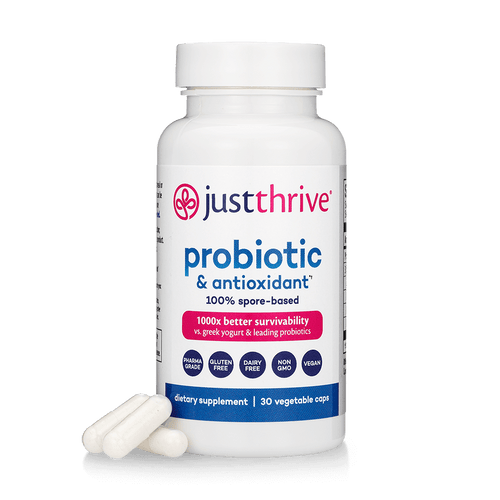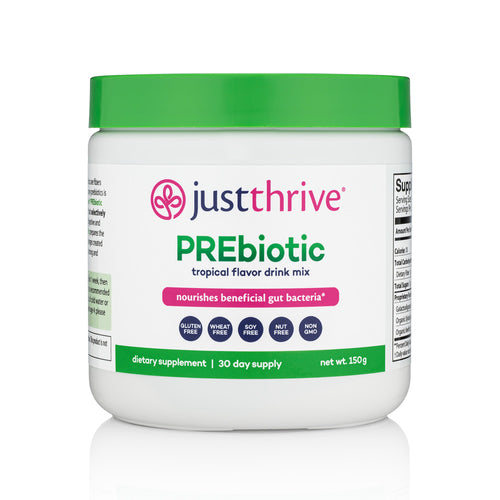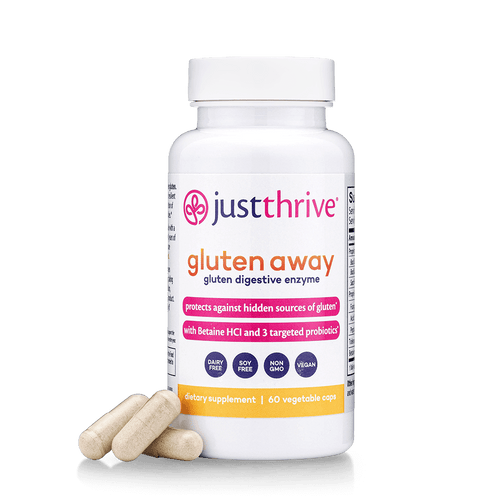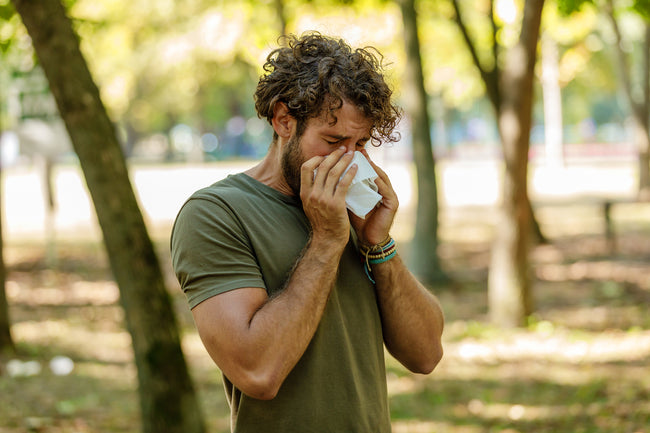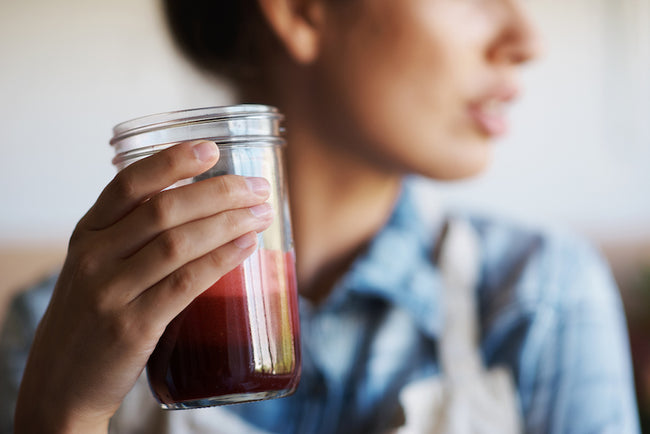You finally started taking probiotics, but you’re not sure they’re making a difference.
After all, you can’t see your gut microbiome—the trillions of bacteria in your gut—so how can you tell if your probiotic supplements are doing anything?
If your probiotic is working to balance your gut microbiome, you’ll notice. Of course, there may not be gigantic, life-changing shifts on day one, but in time, you will start to see changes in your gut health and how you feel overall. That’s because your gut microbiome affects every other system in your body—it’s at the center of everything. And when your gut is out of balance, a condition called dysbiosis, you’ll feel that too.
Taking probiotics is the best way to maintain healthy balance in your gut microbiome. But not all probiotics are the same, and not all of them really work.
Here are seven clear signs that your probiotic is working.
1. Your poop is more regular.
No one likes to talk about it, but a lot of people start taking probiotics because they’re struggling with diarrhea or constipation. And that makes sense, because both of those issues can be directly tied to unbalanced gut microbiomes. Studies show that taking probiotics can help offer lasting relief for poop-related issues.[1][2]
2. Your gut feels more comfortable.
As your microbiome balance shifts toward healthy, your stomach will just feel better. Pathogenic bacteria can cause abdominal discomfort. When probiotics help balance your gut, they’ll help you feel more comfort too.[3]
3. You have less gas and bloating.
Bad bacteria produce more and smellier gas and can cause uncomfortable bloating.[4] Keeping your gut in balance by taking probiotics helps significantly reduce occasional gas and bloat along with other gastrointestinal (GI) symptoms.[5]
4. You’re taking fewer personal days.
More than 70% of your immune system is in your gut, and your gut microbiome plays a huge role in how well your immune system functions. As you’d imagine, an unbalanced gut overrun by pathogens hurts your immunity. But probiotic bacteria support healthy immune responses. So if your immune system is on point, your probiotics are doing their job.[6]

5. Your skin feels less itchy.
Weird as it sounds, your gut microbiome connects to your skin microbiome. When your gut is chock full of beneficial probiotic bacteria, the difference will show up in your skin. Research shows that probiotics can help reduce skin itchiness and sensitivity, and even promote clearer and more healthy looking skin.[7]
6. Your mood is brighter and your brain feels sharp.
Your gut and your brain are directly connected by the vagus nerve, also called the gut-brain axis. Probiotics send positive messages down that pathway, promoting clear thinking and mental flexibility.[8] Plus, a healthy gut plays a key role in neurotransmitter production, including “feel-good” brain chemicals like serotonin and GABA, for better moods.[9]
7. You have more energy.
A healthy gut microbiome promotes healthy digestion, nutrient absorption, and efficient use of nutrients like protein and key vitamins. Probiotics help your body be more fully nourished, so you’ll feel revitalized and energetic.[10] Getting your gut microbiome in healthy balance with probiotics will deliver numerous health benefits. So if you’re not noticing any positive changes, there’s a reason.
Why Isn’t My Probiotic Working?
Just because your probiotic doesn’t seem to be working yet doesn’t mean it won’t. But if you have concerns, here are three important things to consider:
The probiotic you’re taking may not be right for you.
Different probiotics “specialize” in dealing with different issues. So if you’re looking to deal with a specific symptom, make sure the strains you choose have a proven track record for that symptom. Plus, many probiotic brands are delicate, meaning they don’t survive manufacturing, shipping, and storage. If it needs to be refrigerated to stay alive, how will it survive your digestive system?!
You may not have been taking it long enough.
Taking probiotics won’t be a quick fix. It normally takes more than a week to begin to notice changes, so don’t give up. Within a month, most people will feel improvement in gut conditions. But it can take 90 days or more to notice a real, sustainable difference.
What’s on the label may not be what’s in the bottle.
Unfortunately, not all manufacturers are trustworthy. Some may label their probiotic bottles with proven strains that aren’t actually included in the formula. One study found that 43% of probiotic products had a mismatch between the labeling and the contents.[11] So make sure you only buy probiotics from manufacturers you know and trust.

What If My Probiotic Made Me Feel Worse?
Sometimes as your gut starts to balance, you’ll experience something called “die off.” And if that’s happening, it means your probiotic is doing exactly what it’s supposed to do…so DON’T stop taking it. Die off is a normal part of clearing out the bad bacteria and repopulating your gut with beneficial probiotic bacteria.
Luckily, it’s easy to stop or prevent die off symptoms while still gaining all of the benefits of your probiotic. Here are some tips:
- Lower your dose. For example, if you take a whole capsule, start with a half and slowly work your way back up to the full dose.
- Take your probiotic with food.
- Drink plenty of water to flush out the toxins.
- Work up a sweat, which is another way your body gets rid of toxins.
How to Find the Right Probiotic
There are hundreds, maybe thousands, of choices when it comes to choosing a probiotic. And not all of those choices work effectively. So here’s what you should be on the lookout for:
- Spore probiotics, tougher strains that can withstand temperature extremes so they arrive alive and ready to work every time
- Clinically proven strains, such as Bacillus subtilis HU58™ or Bacillus indicus HU36™, especially if you’re looking for help with a specific issue
- Companies with a proven track record for effectiveness and reliability
When you choose the right probiotic and take it regularly, you’ll feel a world of positive differences.
Meet the Probiotic of Your Dreams
Just Thrive Probiotic & Antioxidant contains four clinically studied strains of spore probiotics. Not only have these 4 superstar strains been thoroughly researched individually, they’ve also been tested together with proven effectiveness.
Bacillus indicus HU36™ turns your gut into its own antioxidant factory. Studies show that HU36 produces powerfully protective antioxidants including lycopene, lutein, zeaxanthin, and astaxanthin.
Bacillus subtilis HU58™ produces 12 protective chemical defenders against harmful bacteria and pathogens.
Bacillus coagulans specializes in gut comfort and bowel regularity.
Bacillus clausii can resist damage from a variety of common antibiotics, allowing it to keep your gut in healthy balance even while you’re taking that normally gut-wrenching medication.
You can trust the fact that every bottle of Just Thrive Probiotic & Antioxidant contains exactly what’s on the label, these 4 clinically proven strains of superior spore probiotics.
>> Try Just Thrive Probiotic and Antioxidant today for a probiotic you can count on every day.
Not sure that Just Thrive Probiotic & Antioxidant will work for you? We can help with that.
EVERY Just Thrive purchase is covered by our Bottom of the Bottle, 100% money back guarantee.
So if for any reason you don’t notice a positive difference, you can ask for a full refund at any time. Even if it’s 3 months or 3 years later. And even if the bottle is empty! You’ll get your money back any time, no matter what.
>> Try Just Thrive Probiotic RISK FREE today and save 22% with a subscription.
Sources
- Skrzydło-Radomańska B, Prozorow-Król B, Cichoż-Lach H, Majsiak E, Bierła JB, Kanarek E, Sowińska A, Cukrowska B. The Effectiveness and Safety of Multi-Strain Probiotic Preparation in Patients with Diarrhea-Predominant Irritable Bowel Syndrome: A Randomized Controlled Study. Nutrients. 2021;13(3):756. Published February 26, 2021.
- Allen SJ, Martinez EG, Gregorio GV, Dans LF. Probiotics for treating acute infectious diarrhoea. Cochrane Database Syst Rev. 2010 Nov 10;2010(11):CD003048. Update in: Cochrane Database Syst Rev. 2020 Dec 8;12:CD003048.
- Dale HF, Rasmussen SH, Asiller ÖÖ, Lied GA. Probiotics in Irritable Bowel Syndrome: An Up-to-Date Systematic Review. Nutrients. 2019;11(9):2048. Published September 2, 2019.
- Wei L, Singh R, Ro S, Ghoshal UC. Gut microbiota dysbiosis in functional gastrointestinal disorders: Underpinning the symptoms and pathophysiology. JGH Open. 2021 Mar 23;5(9):976-987.
- Hungin APS, Mitchell CR, Whorwell P, Mulligan C, Cole O, Agréus L, Fracasso P, Lionis C, Mendive J, Philippart de Foy JM, Seifert B, Wensaas KA, Winchester C, de Wit N; European Society for Primary Care Gastroenterology. Systematic review: probiotics in the management of lower gastrointestinal symptoms - an updated evidence-based international consensus. Aliment Pharmacol Ther. 2018;47(8):1054-1070.
- Zhang H, Yeh C, Jin Z, Ding L, Liu BY, Zhang L, Dannelly HK. Prospective study of probiotic supplementation results in immune stimulation and improvement of upper respiratory infection rate. Synth Syst Biotechnol. 2018 Mar 12;3(2):113-120.
- Roudsari MR, Karimi R, Sohrabvandi S, Mortazavian AM. Health effects of probiotics on the skin. Crit Rev Food Sci Nutr. 2015;55(9):1219-1240.
- Kim CS, Cha L, Sim M, Jung S, Chun WY, Baik HW, Shin DM. Probiotic Supplementation Improves Cognitive Function and Mood with Changes in Gut Microbiota in Community-Dwelling Older Adults: A Randomized, Double-Blind, Placebo-Controlled, Multicenter Trial. J Gerontol A Biol Sci Med Sci. 2021 Jan 1;76(1):32-40.
- Mörkl S, Butler MI, Holl A, Cryan JF, Dinan TG. Probiotics and the Microbiota-Gut-Brain Axis: Focus on Psychiatry. Curr Nutr Rep. 2020;9(3):171-182.
- Wang J, Ji H. Influence of Probiotics on Dietary Protein Digestion and Utilization in the Gastrointestinal Tract. Curr Protein Pept Sci. 2019;20(2):125-131.
- Weese JS. Evaluation of deficiencies in labeling of commercial probiotics. Can Vet J. 2003 Dec;44(12):982-3. PMID: 14703084; PMCID: PMC340366.







